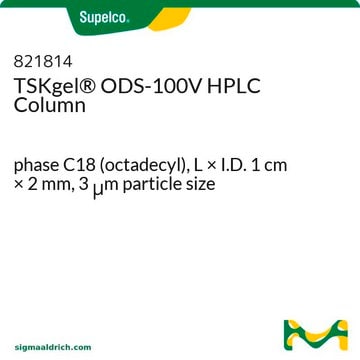8.21814
4-Hydroxybenzoic acid
for synthesis
Synonym(s):
4-Hydroxybenzoic acid
About This Item
Recommended Products
Quality Level
Assay
≥98.0% (HPLC)
autoignition temp.
>250 °C
potency
>5000 mg/kg LD50, oral (Rat)
pH
3.3 (20 °C, 1 g/L in H2O)
mp
213-216 °C
solubility
5 g/L
bulk density
600 kg/m3
storage temp.
2-30°C
SMILES string
Oc1ccc(cc1)C(=O)O
InChI
1S/C7H6O3/c8-6-3-1-5(2-4-6)7(9)10/h1-4,8H,(H,9,10)
InChI key
FJKROLUGYXJWQN-UHFFFAOYSA-N
Application
- Production and Applications of Hydroxy Acids: This study discusses the synthesis of hydroxy acids including 4-hydroxybenzoic acid, focusing on enzymatic routes which are pivotal for drug discovery due to their application in creating more efficient and environmentally friendly production methods (Bhalla et al., 2014).
- Microbial Synthesis from Renewable Feedstocks: Highlights microbial production methods for 4-hydroxybenzoic acid from renewable feedstocks, crucial for sustainable chemical synthesis in pharmaceuticals and material science (Chen et al., 2021).
- Laccase-mediated Oligomerization: Explores the enzymatic oligomerization of 4-hydroxybenzoic acid which could lead to new materials with improved stability and functionality, useful in material science and drug delivery systems (Slagman et al., 2016).
- Antiviral Properties: Discusses the potential of 4-hydroxybenzoic acid derived from the autooxidation of catechinic acid as an antiviral agent against Herpes Simplex Virus, offering potential applications in drug development (Alfei et al., 2022).
- Soil Microbial Community Impact: Investigates the effect of 4-hydroxybenzoic acid on grape soil microbial communities, emphasizing its potential environmental impact and applications in sustainable agriculture and academic studies (Guo et al., 2015).
Analysis Note
Melting range (lower value): ≥ 214 °C
Melting range (upper value): ≤ 217 °C
Identity (IR): passes test
Signal Word
Danger
Hazard Statements
Precautionary Statements
Hazard Classifications
Eye Dam. 1 - STOT SE 3
Target Organs
Respiratory system
Storage Class Code
11 - Combustible Solids
WGK
WGK 1
Flash Point(F)
Not applicable
Flash Point(C)
Not applicable
Certificates of Analysis (COA)
Search for Certificates of Analysis (COA) by entering the products Lot/Batch Number. Lot and Batch Numbers can be found on a product’s label following the words ‘Lot’ or ‘Batch’.
Already Own This Product?
Find documentation for the products that you have recently purchased in the Document Library.
Customers Also Viewed
Our team of scientists has experience in all areas of research including Life Science, Material Science, Chemical Synthesis, Chromatography, Analytical and many others.
Contact Technical Service











